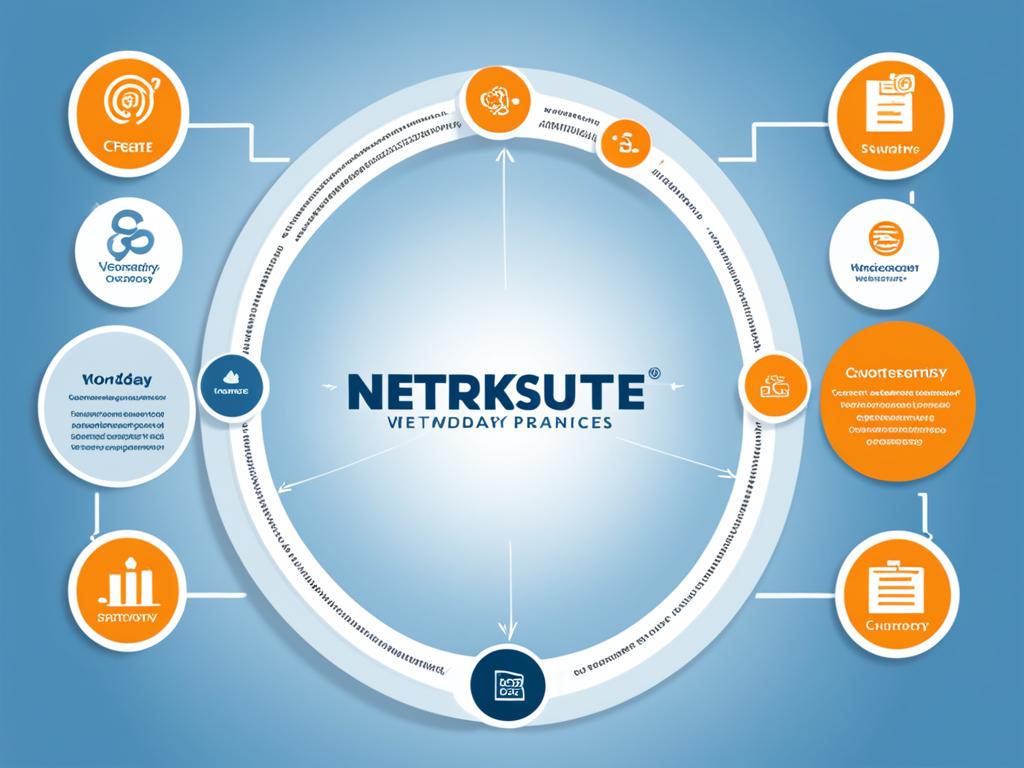When it comes to managing your business’s operations and resources efficiently, choosing the right ERP system is crucial. With so many options available, NetSuite ERP vs Workday ERP have emerged as popular choices for businesses of all sizes.
But which one is the better choice for your organization? In this article, I will compare NetSuite and Workday, taking a closer look at their features, pricing, and implementation process to help you make an informed decision.
Key Takeaways:
- NetSuite and Workday are leading cloud-based ERP system providers.
- Choosing the right ERP system is crucial for efficient business operations.
- NetSuite offers a wide range of CRM, e-commerce, marketing automation, analytics tools, and ERP, while Workday specializes in financial management, human capital management (HCM), planning, analytics, and business intelligence.
- NetSuite pricing is based on the number of users, modules, and additional services, while Workday’s pricing is tailored to each individual company.
- Both NetSuite and Workday offer financial management modules, but NetSuite includes a wider range of functionalities such as CRM, marketing automation, and e-commerce.
Pricing and Cost Comparison
When considering the implementation of an ERP system, cost is a crucial factor to evaluate. In this section, I will provide a comparison of the pricing models for NetSuite and Workday, two leading players in the market.
NetSuite Pricing:
NetSuite offers a transparent pricing structure based on various factors, including the number of users, modules, and additional services. Businesses can expect to pay a monthly licensing fee of $999, which serves as a base cost. Additionally, there is a per-user fee starting at $99. However, it’s important to note that the final cost may vary depending on the specific requirements of each company. NetSuite provides flexibility in pricing, allowing businesses to tailor their package according to their needs and preferences.
Workday Pricing:
Unlike NetSuite, Workday does not disclose its pricing on its website. Instead, the company offers a personalized approach by tailoring prices according to each individual company’s needs during a demo or estimation. While this personalized pricing approach ensures that businesses receive a solution that fits their specific requirements, some customers have noted that Workday’s pricing tends to be higher compared to other ERP providers. This may not be suitable for small and medium-sized businesses with budget constraints. It is advisable to directly contact the companies to get an exact understanding of the pricing details.
To understand the actual cost of implementing NetSuite or Workday, it is recommended to reach out to the respective companies and discuss specific requirements in detail.
Now, let’s move on to the next section and explore a detailed comparison of the features offered by NetSuite and Workday.
Comparison of Features
When comparing the features of NetSuite and Workday ERP, it is important to note their primary focuses. Workday specializes in financial management and human capital management (HCM) solutions, while NetSuite offers a broader range of functionalities beyond these areas.
Both NetSuite and Workday provide financial management modules that offer real-time financial insights, transaction processing, and budgeting cycles. However, NetSuite goes beyond these capabilities and includes additional features such as CRM, marketing automation, and e-commerce, providing businesses with a comprehensive suite of tools to drive success.
Regarding HCM, NetSuite combines various workforce and HR management tools into a single platform, ensuring streamlined processes and efficient workforce management. On the other hand, Workday offers robust HR and talent management features that cater specifically to the needs of businesses in this area.
“NetSuite’s all-in-one solution allows businesses to manage their financials, CRM, and more, all in a single platform.”
Overall, while both NetSuite and Workday provide essential financial management and HCM capabilities, the differentiation lies in the additional functionalities offered by NetSuite. The ability to access customer relationship management tools, marketing automation features, and e-commerce capabilities within the same platform can provide businesses with a competitive edge.
In the race of NetSuite vs. Workday features, NetSuite’s extensive range of offerings makes it an ideal choice for businesses looking for a comprehensive business management solution.
NetSuite vs. Workday Feature Comparison:
| Features | NetSuite | Workday |
|---|---|---|
| Financial Management | ✔️ | ✔️ |
| CRM | ✔️ | ❌ |
| Marketing Automation | ✔️ | ❌ |
| E-commerce | ✔️ | ❌ |
| Human Capital Management (HCM) | ✔️ | ✔️ |
| Talent Management | ❌ | ✔️ |
Conclusion
In the battle between NetSuite and Workday, both ERP solutions have proven themselves to be reputable options in the market. However, it is essential for businesses to assess their specific needs and consider various factors, including pricing, features, and scalability, before making a decision.
For businesses looking for a comprehensive, all-in-one solution with broader automation capabilities, NetSuite is the recommended choice. NetSuite’s extensive range of CRM, e-commerce, marketing automation, analytics tools, and ERP make it a powerful platform for managing various aspects of business operations.
On the other hand, Workday shines when it comes to financial management and human capital management (HCM). With a strong focus on these areas, Workday offers robust features and functionalities that are particularly suitable for mid-sized or larger businesses. Its financial management modules provide real-time financial insights, transaction processing, and budgeting cycles, while its HCM features cater to the specific needs of managing workforce and HR management.
Ultimately, the verdict is clear – NetSuite and Workday each have their own unique strengths that can benefit different types of businesses. Therefore, it is crucial to consult with experts, thoroughly evaluate individual requirements, and consider how well each solution aligns with specific business goals and objectives.

